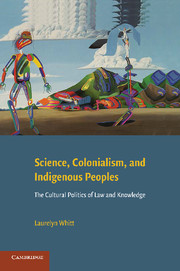Book contents
- Frontmatter
- Contents
- Preface
- Acknowledgments
- First Words
- PART I BIOCOLONIALISM AS IMPERIAL SCIENCE
- PART II THE HUMAN GENOME DIVERSITY PROJECT: A CASE STUDY
- PART III LEGITIMATION: THE RULE AND ROLE OF LAW
- 6 The Commodification of Knowledge
- 7 Intellectual Property Rights as Means and Mechanism of Imperialism
- 8 Transforming Sovereignties
- Conclusion – The Politics of Knowledge: Resistance and Recovery
- Bibliography
- Index
- References
8 - Transforming Sovereignties
Published online by Cambridge University Press: 04 August 2010
- Frontmatter
- Contents
- Preface
- Acknowledgments
- First Words
- PART I BIOCOLONIALISM AS IMPERIAL SCIENCE
- PART II THE HUMAN GENOME DIVERSITY PROJECT: A CASE STUDY
- PART III LEGITIMATION: THE RULE AND ROLE OF LAW
- 6 The Commodification of Knowledge
- 7 Intellectual Property Rights as Means and Mechanism of Imperialism
- 8 Transforming Sovereignties
- Conclusion – The Politics of Knowledge: Resistance and Recovery
- Bibliography
- Index
- References
Summary
Sovereignty carries the horrible stench of colonialism. It is incomplete, inaccurate and troubled. But it has also been rearticulated to mean altogether different things by indigenous peoples. In its link to concepts of self-determination and self-government, it insists on the recognition of inherent rights to the respect for political affiliations that are historical and located and for the unique cultural identities that continue to find meaning in those histories and relations.
– Joanne BarkerLaw, as we have seen, can provide a means of resistance to oppression as well as serve as an instrument of oppression. Indigenists are drawing upon a variety of legal systems and instruments to block the continuation of extractive biocolonialism. They are also working to create legal concepts more reflective of diversity and more responsible in the face of it. The biocolonialism which indigenous peoples are currently experiencing cannot continue without the assistance and support, and often the active collusion, of both surrounding and distant states, the coercive power of which buttresses and overlaps that of transnational corporations. A significant part of the legitimating rhetoric of biocolonialism appeals to a particular understanding of sovereignty, one currently being challenged by a wide array of contemporary critics, including indigenists, who are also shaping alternatives to it. Because the hope of ending biocolonialist practices rests in part upon our ability to move past these oppressive but well-entrenched understandings of sovereign power, such efforts to transform the concept and practice of sovereignty has considerable import for our topic.
- Type
- Chapter
- Information
- Science, Colonialism, and Indigenous PeoplesThe Cultural Politics of Law and Knowledge, pp. 179 - 218Publisher: Cambridge University PressPrint publication year: 2009



